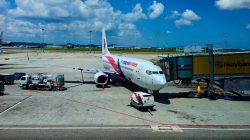As Matthew reported earlier this week, Malaysia Airlines CEO Christoph Mueller has decided to resign from his post in September of this year.
Maybe I tend to get more amped up more than most when I learn about organizational restructurings at volatile airlines, but when I learned of this while catching up on my news Tuesday morning, my stomach dropped a bit. My initial thought was, “that can’t be good.”
Related: To those who believe United doesn’t need Gordon Bethune back, think again
I think that Matt can relate to this sentiment as well. If you haven’t had a chance yet, please check out our podcast from last fall where he, Brad and I speak about Jeff Smisek’s departure from United (and hint hint: maybe this would be an interesting topic to cover in an upcoming Upgrd podcast edition).
I think that the real reason why we are duped by this news is because we all have a vested interest in Malaysia Airlines and its recovery plan. The carrier has been dealt some brutal tragedies over the past few years, its two horrific accidents nonwithstanding. Even prior to the disappearance of MH370, the company was a complete basketcase. It had been through multiple ineffective restructurings over a period of several years. It was the airberlin of Southeast Asia (coincidentally, also one that happened to join the OneWorld alliance roughly around the same time).
At upgrd, all of us have high-standards in terms of where we place our money, loyalty and value among global airlines and hotel chains. But in the end, we all want to champion for every carrier that flies and competes above 30,000 feet. I, for example, never flew Skybus back in 2008 when it was the talk of the skies. Nor did I have any intention to fly it (I mean, who wants to self-connect at Columbus in flying in between Portsmouth, N.H. and Punta Gorda, F.L.). But I didn’t want the airline to fail. I didn’t want to see an airline grounded after people had spent time, money and energy investing into the infrastructure of the airline, no matter how poorly-timed or executed it was.
In that same vein, we all want Malaysia Airlines to rebound and succeed It is, after all, the flag carrier of Malaysia. It has a rich history of serving its country and its People. Furthermore, I’ve heard numerous stories about the wonderful individuals who work for the carrier and hold a sense of pride and bravery that is all around inspiring. But I think the part that becomes the so frustrating for all of us is that the departure of Christoph Mueller might cause MAS to relapse into its old, bad habits of cover-ups, poor decisions and secrecy.
We learned from Muellers’ remarkable turnaround of Aer Lingus that he came to a broken MAS with outstanding credibility. There were many parallels between the state of both carriers upon his arrival: lack of consistent profitability, demoralized employees, unclear and varying ownership direction, aging fleet and inefficient utilization of capacity and resources, dwindling network, fierce low-cost carrier competition and overall, inability to bed down a proper vision and strategy on who and what it wanted to be.
The steps that Mueller generally takes at the beginning are painful pills to swallow, but sometimes, those are necessary evils on the long road to recovery. Indeed, MAS reduced a massive component of its workforce and slashed a lot of trunk routes to Europe and Australia. But these were also steps that MAS’ previous leadership had been too risk-averse to take, or didn’t know how to fully execute upon them with purpose and integrity. In fact, one could argue that it is because of this series of missteps that ultimately led the carrier to become so poorly equipped to address the two disasters in 2014 that it was unfortunately dealt.
By no means am I resentful about Mr. Mueller’s departure from MAS. We only know as much as we know, and the most up-to-date reason we’ve been given so far is that it is for personal reasons. I get that. We all do. Family comes first. He was uprooted from his base in Europe and placed in an environment where, unfortunately, Sharia law seems to be taking on a rather formidable face in how it interferes with corporate relations and personal perceptions. That can severely alter the context of a work environment even for the most seasoned, globally-conscious and well-intended CEOs. Furthermore, I cannot seem to forgive the people who made some severely racist comments about Mr. Mueller when it was announced that he’d be coming to lead MAS. To me, this reflects so poorly on the country of Malaysia and the globalized education standards it purportedly sets for its citizens (or lack thereof) despite wanting to brand itself as an engine for the ASEAN region. Clearly, the country has some major issues that it needs to address, and quickly.
But right now, I think we can say that Mueller is leaving MAS in a state that is very much work-in-progress. And, since Progress is not Malaysia’s strong suit, at least without a proper leader, that essentially leaves the carrier in a state of, “work” as Mr. Mueller heads back to Europe this fall.
And, there appears to be a lot of uncertainty whether or not Malaysia Airlines Berhad will be salvageable with Mueller stepping off the stage in a few months. Personally, I’m not overly optimistic.
You may wonder why I care so much about airline leadership. I try to keep a pulse on topics such as these because I think that engaging in healthy, progressive dialogue about airline leaders, especially during transition periods, is exceptionally important and critical to our understanding of the industry as it evolves. No, I do not mean it in the, “he did this, she did this,” sense, speaking of topical things like comments from Qatar’s “His Excellency” Akbar Al Baker or his back-and-forth vitriole with Delta’s Richard Anderson, who will be stepping down in just a few days.
Rather, I’m curious to know what people think about leadership style, response to the changes into todays global and aviation environment, and some of the soft skills necessary to empower people. For example, I think it would be fascinating to assess why JetBlue CEO Robin Hayes decided that Virgin America wasn’t worth the $2 billion price tag, but Alaska Ceo Brad Tilden did? And, speaking of Brad Tilden, is he someone who is equipped to absorb an airline, albeit small and relatively new, into a workforce like Alaska’s that marches to the beat of a Seattle drum? As I recall, after living in Minneapolis for several years, which is essentially a Midwest version of Seattle, people are progressive and open-minded, but are engrained in their traditions and ways of thinking. Change takes a lot of time and education.
Meanwhile, literally on the other end of the country, what is going through Spirit CEO Bob Fornaro’s head right now as he sees another consolidation coming up in the US airline industry? Is it time to start preparing for an Ultra-Low Cost carrier merger between Frontier and Spirit?
Taking a more global view, I’d love to get into Turkish Airlines’ Temel Kotil’s head about the new saftey and security concerns in Turkey and how the carrier has managed to so strategically avoid the impact of that, as the airline that flies to the most number of countries in the world, including ravaged nations like Iraq, Syria, Somalia and Sudan. It would also be neat to get a perspective from LATAM CEO Enrique Cueto, who came from the LAN side of the equation, typically a well-run and more conservative entity, who is now dealing head-on with some of the major challenges involved in the Brasilian market, where airspace is limited, infrastructure is limited, the economy is in shambles and so much is changing.
Now that the focus on airline profitability has taken a back-burner, and times are better than before, I’d love for others to weigh-in on organizational elements. Who do you admire as a leader, and what can we learn from those who think outside the box, take on the daunting and endow others with skills to succeed?
I know Mr. Mueller was one of those guys. I am truly sad to see that things didn’t pan out differently at MAS.




